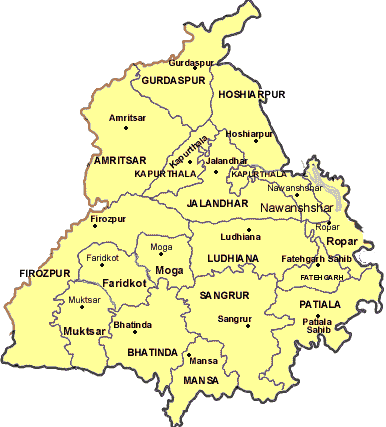Hyderabad based NGO transforms Punjab villagers’ lives with clean drinking water
 Abohar, Aug. 10 : Life of a large number of villagers in Punjab’s Muktsar district has transformed since they have been enabled to have safe drinking water with the initiative of a non-governmental organization here.
Abohar, Aug. 10 : Life of a large number of villagers in Punjab’s Muktsar district has transformed since they have been enabled to have safe drinking water with the initiative of a non-governmental organization here.
Till recently, the villagers had to cope up with the contaminated groundwater which had threatened their lives due to water borne diseases caused by such a water.
While taking into consideration villagers’ plight, the Punjab government approached Naandi Foundation, a Hyderabad-based NGO which had a proven record in offering drinkable water through setting up reverse osmosis (RO) technology based plants.
In January 2008, the State government invited Naandi Foundation to provide safe drinking water to the people of Gidderbaha and the `Shudh Jal Priyojna’ (pure water project) project was launched.
Naandi Foundation sourced the reverse osmosis (RO) technology from Tata Projects costing 645,000 dollars. The RO plants set up in 57 villages are now benefiting over
400,000 people.
Residents in Gidderbaha town in Muktsar district were compelled to drink water containing inorganic salts like calcium, magnesium, potassium, chlorides and sulfates. These minerals caused several water-borne diseases, including cancer. The groundwater total dissolved solids (TDS) count ranged from 1,500 to 9,000 even when the prescribed standards for safe drinking water are expected to be between 50 to 70.
“The water consists of harmful materials like nitrate and fluoride, which cause fluorosis and nitrates affect the health of young children. Besides that they also cause viral infection and bacterial diseases and the total dissolved solids harm the human body. Basically, it causes problems of indigestion and arthritis. The number of cases of fluorosis is high. All these problems are caused by contaminated ground water,” said Amiya Shanker, Project in-charge of Naandi’s Safe Drinking Water Programme, Giddharbaha.
For urban users, RO is considered among the more expensive water filtration technologies. At the community level, this scheme has ensured that the treated water is sold at Rs. 1 per litre for domestic use and Rs. 1.50 a litre for commercial use.
”We never thought that we would ever drink this water in our life. There were around 95 percent patients of arthritis but since the RO water purifier has been installed here in our village, people have been drinking the water for 6 months to a year have realized that the water is pure and it doesn’t cause any diseases,” said Kaur Singh, a villager.
“It is said when the water is boiled, it kills all the germs in water. We used to provide a litre water bottle at 12-15 rupees but now we get a 20 litre water can for Rs. 2. The poor people can’t install RO water purifier at their homes. Many villagers have installed RO water purifiers in their houses. The poor farmers have benefited a lot from it,” said Raj Kaur, the village head of Fakarsar.
Encouraged by the response to RO drinking water plants in Gidderbaha, the state government is now planning to expand the project to 471 more villages in the districts of Mansa, Faridkot, Muktsar and Bathinda.
RO-treated water has not only brought tangible health benefits for the locals but has also revealed that people are willing to pay for quality public service. (ANI)